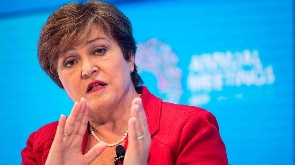 Kristalina Georgieva is the IMF Managing Director
Kristalina Georgieva is the IMF Managing Director
Following the announcement of an agreement being reached by Ghana and its official creditors under the Group of 20 Common Framework for Debt Treatment, Ms Kristalina Georgieva, Managing Director of the International Monetary Fund (IMF), has welcomed the deal.
In a statement on Friday, 12 January 2024, she said: “I welcome Minister of Finance Ofori-Atta’s announcement that the Ghanaian authorities have reached an agreement in principle with their official creditors on a debt treatment, consistent with the objectives of the IMF-supported programme, which aims to restore macroeconomic stability and debt sustainability, build resilience, and lay the foundations for stronger and more inclusive growth.”
She added: “I want to thank the Official Creditor Committee, especially the co-chairs, China and France, for all their work to reach this agreement. This is another substantial milestone for the G20 Common Framework under which G20 creditors joined forces to agree on debt relief for Ghana”.
“This agreement clears the path for IMF Executive Board consideration of the first review of Ghana’s three-year Extended Credit Facility Arrangement in the next few days. I look forward to continuing our fruitful collaboration with Ghana.”
Ghana started talks with the IMF in 2022 for a $ 3-billion Extended Credit Facility (ECF). The Ghanaian authorities’ economic programme, supported by the ECF arrangement, builds on the government’s post-coronavirus disease 2019 Programme for Economic Growth, which aims to restore macroeconomic stability and debt sustainability and includes wide-ranging reforms to build resilience and lay the foundation for stronger and more inclusive growth.
The IMF noted in the past that “securing timely debt restructuring agreements with external creditors will be essential for the successful implementation of the new ECF arrangement”.
Some key policies under the authorities’ programme include “large and frontloaded fiscal consolidation to bring public finances back on a sustainable path, complemented by efforts to protect the vulnerable”.
The adjustment effort, the IMF noted, “will be supported by ambitious structural reforms in the areas of tax policy, revenue administration, and public financial management, as well as steps to address weaknesses in the energy and cocoa sectors. An ambitious structural reform agenda is being put in place to reinvigorate private sector-led growth by improving the business environment, governance, and productivity.”